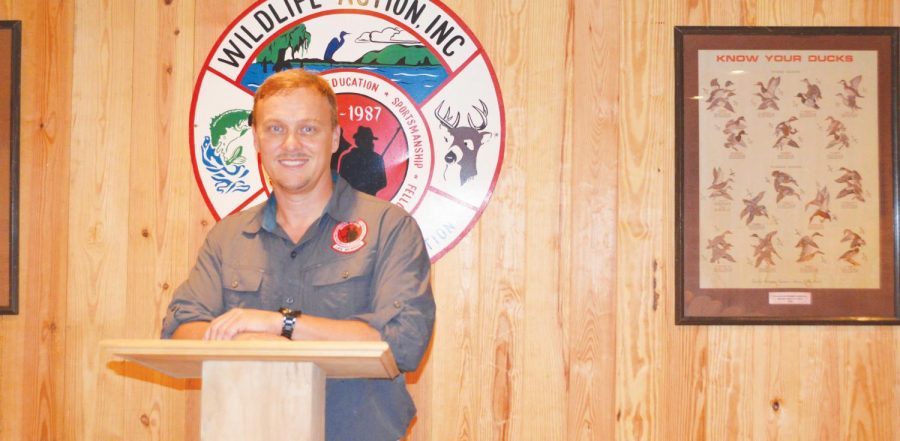Alumnus receives biology department award
Photo by: Sarah Jones
FMU graduate Frank Oliver recieved the Lawrence F. Swalls award for his contributions to FMU and his community.
FMU alumnus and CEO of Wildlife Action, Inc., Frank Oliver was named the 2017 recipient of the Lawrence F. Swails award for his outstanding achievements after graduation.
The Department of Biology annually gives this award in honor of the department’s original chairman to an alumnus or alumna who has shown exceptional professional achievement and constant support of the university and his or her community.
According to FMU President Dr. Fred Carter, it was not a difficult decision for the university to present the award to Oliver this year. Oliver said he was honored to receive this award, and he was personally touched by the flyer given to him from faculty.
“Out of the presentation and all the different things I was given, the thing that I liked the most was the signed flyer with personal notes from all the people who were present with me,” Oliver said. “That meant the most to me.”
During his time at FMU, Oliver said he explored his love for nature and biology with the help of his professors. According to Oliver, most of his passion for nature stemmed from encouragement from Associate Professor of Biology Travis Knowles, who showed Oliver that he could turn his passion into a career.
Oliver said he was introduced to Dr. Vernon Bauer during his senior year at FMU. Oliver said Bauer recognized him as an involved biology student both in and out of the classroom.
According to Oliver, he participated in many research projects alongside Knowles, and he was a Part-time Instructor of Biology Hope Camper in addition to his own independent research projects.
Wildlife Action’s 60-acre property belonging to the national chapter is located in Mullins, S.C., is near the Little Pee Dee River and has a 1.2-mile interactive trail with learning stations for students and campers. It was founded in 1977 by seven original members.
Oliver said the summer camps are only a portion of the projects the organization does. Last summer, the camp had a total of 314 children attend the camp. One of the most important camp philosophies is the need to unplug and detach from electronics. Campers are not allowed access to television, radios, computers or cellphones for the duration of camp. This allows them to unplug and learn about nature, according to Oliver.
Oliver said the campers learn about the outdoors and how to preserve nature, but camp leaders also allow them to participate in team building activities to promote problem-solving and leadership skills. Oliver said the campers typically learn about nature in several different ways.
According to Oliver, environmental education is typically two parts: it’s normally outdoor skills, which are canoeing, archery, gun safety and fishing; then environmental education includes teaching about snakes, birds of prey, soil profiles or plant and animal identification, Oliver said.
Aside from conducting summer camps, Wildlife Action offers guided tours for groups, rents the space to other organizations and hosts events such as family reunions, wedding receptions and environmental education programs.
Oliver said the main reasons he enjoys working with the summer camps are the impact he makes on young campers and his passion for nature.
“The reason I fell in love with this place is the family atmosphere and working with the kids,” Oliver said. “I love the family atmosphere and believe children need to be taught about the outdoors.”
